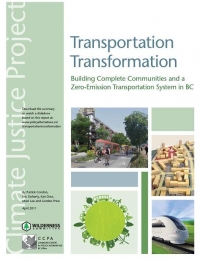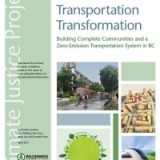 Shifting spending from freeways to transit will not only reduce
Shifting spending from freeways to transit will not only reduce
BC’s greenhouse gas emissions, but lead to healthier, safer communities for all
British Columbians. This is the conclusion of a new study which I co-authored with
Patrick Condon, Kari Dow, Marc Lee and Gordon Price.
Transportation Transformation: Building Complete
Communities and a Zero-Emission Transportation System in BC, co-published by the Canadian Centre for Policy Alternatives and
the Wilderness Committee, sets out key strategies for urban, suburban and rural
areas that will improve transportation and quality of life at the same time.
“Instead of allocating billions of precious tax dollars on
wider roads and bigger bridges, like we’re doing now, we need to build a
province-wide zero-carbon public transportation system,” says co-author Patrick
Condon, UBC chair in Landscape and Livable Environments and a leading figure in
sustainable design.
The study proposes an annual investment of $2 billion over
the next ten years, much of it re-allocated from roadway expansion, with the goal
of creating a zero-emission transportation system by 2040. As we point out,
“Spending public funds on highway expansion and low carbon transportation is
analogous to applying a car’s accelerator and brake at the same time.” The
likely result, whether for a car or society, is a breakdown.
In our report, we argue that investments in electric public
transit need to lead land use changes to create complete communities. Changes
in transportation systems can be made quickly, while land use changes often
take longer and are largely determined by transportation spending decisions.
You can’t create true transit oriented development without good transit
service.
To get to zero emissions, the study envisions a province of
“complete communities” – in which residents do not have to travel far to meet their
day-to-day needs. Instead, they would be able to walk, bike or use electric
public transit for most trips, and use shared electric vehicles. Complete
communities have a mix of housing types (including affordable options), decent
jobs, public services, parks and other public spaces, and commercial districts
with restaurants, offices and retail outlets. The exact mix of transportation
modes will depend on whether a community is urban, suburban or rural.
Economist Marc Lee, a co-author of the study, points out
that transportation of people and goods accounts for about 40 per cent of BC’s
greenhouse gas emissions. He proposes that transforming transportation is the
logical next step in BC’s climate action agenda.
“If we think of the carbon tax as the stick, then a new
transportation system is the carrot,” says Lee. “Many British Columbians who
live in suburban and rural areas resent paying the carbon tax, and with good
reason: they’ve been penalized for driving, but they aren’t provided with any
alternatives. And that’s what we’re laying out here: an effective, doable
alternative.”
Ben West, the Wilderness Committee’s lead climate
campaigner, is not waiting long to translate this new report into action. He is helping a youth group to organize
an Earth Day Parade, concert and info fair this Friday, April 22 – a central
message of this event is the need to shift transportation spending from roads
to transit. The Earth Day Parade starts
at 11am at the Broadway and Commercial SkyTrain station.
Other groups are not waiting either. Lower Mainland Council
of Canadians chapters have teamed up with StopThePave.org
for an Earth Day Mass Direct Action to stop freeway expansion and shift funding
to transit. The action starts at 2pm at the Annieville Supermarket in North
Delta, 10996 River Road, Delta. People can go to both events: at the end of the
Earth Day Parade a group
bicycle ride will leave for the Delta action. People who want to stay at
the concert and info fair longer can take free buses directly to the action,
starting at about 2pm. More details can be found at StopThePave.org.
This is one report that is not gathering any dust. In the
Lower Mainland, the Transportation Transformation starts this Friday.
So get out there and take part if you can – it’s the
perfect way to celebrate Earth Day.
The full report is
available from www.policyalternatives.ca/transportationtransformation.
A slide show based on the report will be available at the same web page soon.


to mlj. the government should provide us with an alternative to using cars. we want and need public transportation now. most people want to use public transportation instead of vehicles if it were available. what is STUPID is that our government is building more freeways and it is STUPID of us if we do not do all we can to STOP it. are you coming to the action in delta friday. who was it that said, ‘if you are not part of the solution then you are part of the problem’. hope to see you in delta.
i am wondering how many more environmental disasters we have to suffer before people park the auto
i am wondering where they think all that exhaust goes and why do we put up decade after decade with the filth, stink, toxic air,stress and NOISE
i can’t stand to hear another engine start up right beside me when i go get some groceries, walk to the library or go any where
most environmentalists are still driving and… hybrids are not a solution
what STUPID design to make humans share pathways with autos
the government should provide us with gasmasks, ear muffs and bubble suits